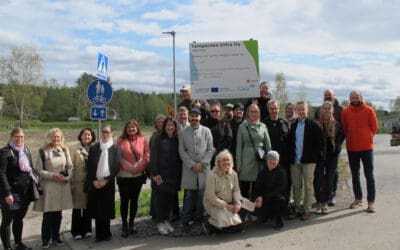In 2018, external experts evaluated the impact of Interreg Baltic Sea region at the mid-point of the programme period. After extensive surveys and interviews with various stakeholders, including project partners, field experts and co-ordinators of the EUSBSR, external evaluator Spatial Foresight found, among other conclusions, that 97% of project partners believe they benefit as an organisation from their Interreg Baltic Sea Region project.”

©panthermedia/zothen
Generating new knowledge
The main benefits of participating in Interreg Baltic Sea Region were generating and adopting new knowledge, according to survey respondents. Most partners cited as benefits “learning from other regions/countries”, “new contacts and access to networks”, “learning in a specific thematic field” and “learning with practical examples and applications”.
Impacts of different types of partners
In addition, the evaluators looked at the involvement of private partners, which was a new programme feature in the current funding period. They concluded, “Private for-profit partners bring certain benefits to a project”. Benefits cited were “the transfer of project results into practice”, a “wider distribution of project results” and “practical ‘on-the-ground’ knowledge”.
Changes in the involvement of public authorities in projects were also investigated. In Baltic Sea Region Programme 2007-2013, public authorities made up roughly 39% of project partners. That share dropped to 27% in the current 2014-2020 period. “The involvement of public authorities is regarded as key both in terms of policy orientation and quality of the overall project goals, and in terms of knowledge transmission and sharing. Thus, a reduced participation of public authorities might lead to a lower transfer of project results into public policies and narrower dissemination of project results,” concluded Spatial Foresight.
Supporting the macro-regional strategy
Furthermore, Interreg Baltic Sea Region was found to be an important funding source for the coordination of the EU Strategy for the Baltic Sea Region. The majority of the surveyed coordinators of the Strategy said that the Programme was “the most relevant funding source” in their work. Out of EUSBSR stakeholders, 79% of respondents believe the Programme to be “highly or very highly relevant for EUSBSR coordination”.
Communication and performance of the MA/JS
Project partners indicated in the survey that “the Programme is widely effective or even very effective in achieving its general communication objectives,” and 84% “feel there is more awareness [of the Programme] among target groups due to their projects.”
Finally, on the performance of the MA/JS, the evaluators found that Monitoring Committee members “are generally very satisfied with the work of the MA/JS” and “regard the MA/JS as very professional and competent.” They conclude: “Overall, the high level of effectiveness seen in the achievements of the MA/JS confirms that the resources are spent in an efficient way.”
All conclusions and case studies can be found in the final report in the links below.
- FINAL BSR midterm evaluation executive summary
- Mid-term evaluation | Final report
- Mid-term evaluation | Recommendations
- Case study report Baltic Tram
- Case study report SMARTBLUE
- Case study report BaltSenior
- Case study report IWAMA
- Case study report LowTEMP
- Case study report BALTIC BLUEGROWTH
- Case study report EMMA
- Case study report Go LNG
- Monitoring report BSR 180817






